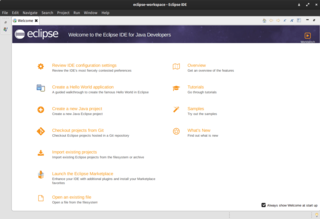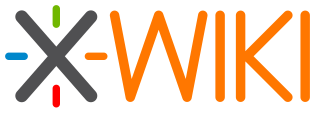
MySQL is an open-source relational database management system (RDBMS). Its name is a combination of "My", the name of co-founder Michael Widenius's daughter My, and "SQL", the acronym for Structured Query Language. A relational database organizes data into one or more data tables in which data may be related to each other; these relations help structure the data. SQL is a language that programmers use to create, modify and extract data from the relational database, as well as control user access to the database. In addition to relational databases and SQL, an RDBMS like MySQL works with an operating system to implement a relational database in a computer's storage system, manages users, allows for network access and facilitates testing database integrity and creation of backups.

PostgreSQL, also known as Postgres, is a free and open-source relational database management system (RDBMS) emphasizing extensibility and SQL compliance. PostgreSQL features transactions with atomicity, consistency, isolation, durability (ACID) properties, automatically updatable views, materialized views, triggers, foreign keys, and stored procedures. It is supported on all major operating systems, including Linux, FreeBSD, OpenBSD, macOS, and Windows, and handles a range of workloads from single machines to data warehouses or web services with many concurrent users.
SourceForge is a web service that offers software consumers a centralized online location to control and manage open-source software projects and research business software. It provides source code repository hosting, bug tracking, mirroring of downloads for load balancing, a wiki for documentation, developer and user mailing lists, user-support forums, user-written reviews and ratings, a news bulletin, micro-blog for publishing project updates, and other features.

LiveJournal, stylised as LiVEJOURNAL, is a Russian-owned social networking service where users can keep a blog, journal, or diary. American programmer Brad Fitzpatrick started LiveJournal on April 15, 1999, as a way of keeping his high school friends updated on his activities. In January 2005, American blogging software company Six Apart purchased Danga Interactive, the company that operated LiveJournal, from Fitzpatrick.

SpiderMonkey is an open-source JavaScript and WebAssembly engine by the Mozilla Foundation.

KDevelop is a free and open-source integrated development environment (IDE) for Unix-like computer operating systems and Windows. It provides editing, navigation and debugging features for several programming languages, and integration with build automation and version-control systems, using a plugin-based architecture.

Eclipse is an integrated development environment (IDE) used in computer programming. It contains a base workspace and an extensible plug-in system for customizing the environment. It is the second-most-popular IDE for Java development, and, until 2016, was the most popular. Eclipse is written mostly in Java and its primary use is for developing Java applications, but it may also be used to develop applications in other programming languages via plug-ins, including Ada, ABAP, C, C++, C#, Clojure, COBOL, D, Erlang, Fortran, Groovy, Haskell, JavaScript, Julia, Lasso, Lua, NATURAL, Perl, PHP, Prolog, Python, R, Ruby, Rust, Scala, and Scheme. It can also be used to develop documents with LaTeX and packages for the software Mathematica. Development environments include the Eclipse Java development tools (JDT) for Java and Scala, Eclipse CDT for C/C++, and Eclipse PDT for PHP, among others.

XWiki is a free wiki software platform written in Java with a design emphasis on extensibility. XWiki is an enterprise wiki. It includes WYSIWYG editing, OpenDocument based document import/export, semantic annotations and tagging, and advanced permissions management.

Launchpad is a web application and website that allows users to develop and maintain software, particularly open-source software. It is developed and maintained by Canonical Ltd.

Pitivi is a free and open-source non-linear video editor for Linux, developed by various contributors from free software community and the GNOME project, with support also available from Collabora. Pitivi is designed to be the default video editing software for the GNOME desktop environment. It is licensed under the terms of the GNU Lesser General Public License.
Google Developers is Google's site for software development tools and platforms, application programming interfaces (APIs), and technical resources. The site contains documentation on using Google developer tools and APIs—including discussion groups and blogs for developers using Google's developer products.

Aptana, Inc. is a company that makes web application development tools for use with a variety of programming languages. Aptana's main products include Aptana Studio, Aptana Cloud and Aptana Jaxer.

Zotero is free and open-source reference management software to manage bibliographic data and related research materials, such as PDF and ePUB files. Features include web browser integration, online syncing, generation of in-text citations, footnotes, and bibliographies, integrated PDF, ePUB and HTML readers with annotation capabilities, and a note editor, as well as integration with the word processors Microsoft Word, LibreOffice Writer, and Google Docs. It was originally created at the Center for History and New Media at George Mason University and, as of 2021, is developed by the non-profit Corporation for Digital Scholarship.

Software remastering is software development that recreates system software and applications while incorporating customizations, with the intent that it is copied and run elsewhere for "off-label" usage. The term comes from remastering in media production, where it is similarly distinguished from mere copying.

PyDev is a third-party plug-in for Eclipse. It is an Integrated Development Environment (IDE) used for programming in Python supporting code refactoring, graphical debugging, code analysis among other features.

Etherpad is an open-source, web-based collaborative real-time editor, allowing authors to simultaneously edit a text document, and see all of the participants' edits in real-time, with the ability to display each author's text in their own color. There is also a chat box in the sidebar to allow meta communication.

Google Wave, later known as Apache Wave, was a software framework for real-time collaborative online editing. Originally developed by Google and announced on May 28, 2009, it was renamed to Apache Wave when the project was adopted by the Apache Software Foundation as an incubator project in 2010.

Chromium is a free and open-source web browser project, primarily developed and maintained by Google. It is a widely-used codebase, providing the vast majority of code for Google Chrome and many other browsers, including Microsoft Edge, Samsung Internet, and Opera. The code is also used by several app frameworks.

Unknown Horizons is a city-building game and real-time strategy game, inspired by the Anno series. It is released under the GNU General Public License (GPLv2) and is therefore free and open source software. Much of the artwork is open content under e.g. CC BY-SA Creative Commons licenses. The game is still under active development; milestone snapshots are released occasionally.
Authorea is an online collaborative writing tool that allows researchers to write, cite, collaborate, host data and publish. It has been described as "Google Docs for Scientists". It has been owned by the commercial publishing company Wiley through Atypon since 2018.















